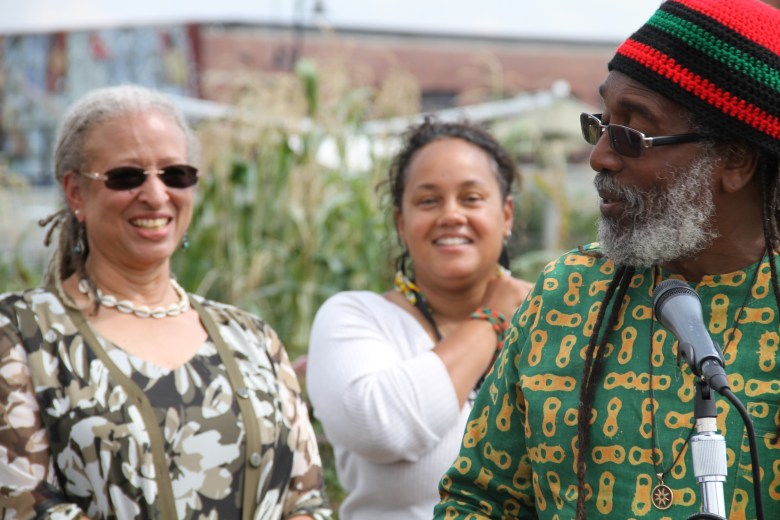
This story was republished from BridgeDetroit.
Tepfirah Rushdan said she could pinpoint the exact moment Mayor Mike Duggan realized urban farmers needed more support from the city.
It was during a recent meeting between city officials and leaders in Detroit’s vibrant agriculture community about a new land value tax proposal championed by the mayor. Farming advocates successfully pushed for changes that would save city farms and community gardens from paying higher taxes but also brought the mayor a list of other barriers preventing residents from growing food despite the availability of vacant land across Detroit.
“Somebody was like, ‘hey, I need to talk to the water department because they’re not turning on my spigot,’ and someone else was like, ‘the land bank is not getting me the property,’ and all these other issues were arising,” Rushdan said. “I saw the moment on (Duggan’s) face where he (realized) it’s not easy to get through the process.”
Duggan named Rushdan, 43, as Detroit’s first Director of Urban Agriculture on Monday, following other major U.S. cities like Atlanta, Boston, Philadelphia and Washington, D.C. Rushdan will earn a $112,000 salary in the new position.
“I didn’t understand the number of obstacles the farmers were facing until I started going to meetings on the land value tax,” Duggan said. “I really started to get mad when I was listening to how hard it was to get land and how hard it was to get a permit. I just didn’t know. At the end of the day, rather than me problem solve with 100 farmers who were having trouble with the bureaucracy, it seems simpler to bring somebody in to fix the bureaucracy.”
Rushdan said the experience highlighted a problem urban farmers have been dealing with for years.
“A lot of times we find the folks in higher up positions don’t know the issues,” Rushdan said. “We’re struggling on the ground and they don’t even know why that struggle is happening. Conveying those struggles to those people who have the power to move those things is my top priority.”
The mayor said Rushdan will serve as a liaison between the city and grassroots organizations to solve common headaches farmers face when acquiring land and securing funding. Duggan said Rushdan was the top choice when he asked farmers who should help shape city rules for urban agriculture. She is the co-director at Keep Growing Detroit, a leading organization in the city’s food sovereignty movement, and co-founded the Detroit Black Farmer Land Fund, which provides residents with capital for farming projects.

“It’s probably something we should have done sooner, but I’m really glad we’re doing it now,” Duggan said.
“You are now going to have a unified voice within the administration that says urban farming is valued, its expansion is critical to our future and there is a leader inside the city who is going to make that happen,” he added.
Farmers and advocates celebrated Rushdan’s appointment in a press conference at Keep Growing Detroit’s flagship 1.5-acre location near Eastern Market. Kathryn Underwood, a retired city planner involved in urban agriculture policy work, said the decision comes at a time when many residents are struggling to access quality food.
“We have so many neighborhoods that are depopulated, so there aren’t viable grocery stores and places to get food in those neighborhoods,” Underwood said. “Particularly in lower-income areas, people are going to the dollar store, they’re going to the gas station, they may have to travel to get fresh food.”
Malik Yakini, executive director of the Detroit Black Community Food Security Network, said Rushdan will help coordinate the efforts of community organizations to promote food sovereignty, which means giving residents more ownership of where their groceries come from.
“We are trying to create a city where Detroiters are producing significant quantities of our food and where we have the infrastructure to be able to process and distribute that food – and where we change this shameful situation where Detroit’s majority Black population has money extracted from our community every time we go to purchase food,” Yakini said.

Council Member Fred Durhal III said urban farmers are filling the gap left by a lack of quality affordable grocery stores throughout the city. Urban farms also bring abandoned properties into productive use and improve neighborhoods, he said. Council Member Scott Benson said he’s hoping the new position leads to initiatives that support composting and independent food networks.
“Our government now is taking urban farming seriously,” Durhal said. “We’re putting money where our mouth is and putting folks in place who do the real work every day on the ground.”
Acquiring land for urban farms is one of the top challenges cited by city leaders. Duggan said farmers identified problems with the Detroit Land Bank Authority and the city’s Buildings, Safety, Engineering and Environmental Department (BSEED) when it comes to buying lots and securing permits. Rushdan said it can take years for farmers to buy vacant parcels from the land bank, and residents also run into problems with BSEED inspectors who aren’t properly trained.

Duggan said there were 45,000 abandoned homes in Detroit when he took over as mayor a decade ago. Since then, 25,000 have been knocked down, while 15,000 were rehabilitated and 5,000 are still left. During that effort, the mayor said he’s heard urban farmers calling for more access to land that was being opened up.
“Farmers and gardeners have been having an infamously hard time going through the land purchase process,” Rushdan said. “ I’ve been working on that for probably 10 years … There’s a hold on property that doesn’t need to be, there’s people who are getting rejected for no reason, there’s people who are taking an abnormally long time through the process. Most gardeners don’t really understand what it takes to get permitted. I’m hoping to bridge that gap.”

